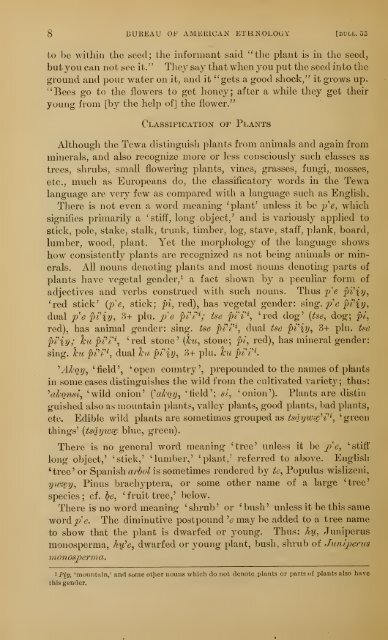Untitled - Smithsonian Institution
Untitled - Smithsonian Institution
Untitled - Smithsonian Institution
Create successful ePaper yourself
Turn your PDF publications into a flip-book with our unique Google optimized e-Paper software.
8 BUREAU OF AMERICAN ETHNOLOGY [bull. 55<br />
to be within the seed; the informant said ''the phmt is in the seed,<br />
but you can not see it." They say that when you put the seed into the<br />
ground and pour water on it, and it ''gets a good shock," it grows up.<br />
"Bees go to the flowers to get honey; after a while they get their<br />
young from [by the help of] the flower."<br />
Classification of Plants<br />
Although the Tewa distinguish plants from animals and again from<br />
minerals, and also recognize more or less consciously such classes as<br />
trees, shrubs, small flowcrmg plants, vines, grasses, fungi,, mosses,<br />
etc., much as Europeans do, the classificatory words in the Tewa<br />
language are very few as compared with a language such as English.<br />
There is not even a word meanmg 'plant' unless it be p'e, which<br />
signifies prunarily a 'stift', long object,' and is variously applied to<br />
stick, pole, stake, stalk, trunk, timber, log, stave, staff, plank, board,<br />
lumber, wood, plant. Yet the morphology of the language shows<br />
how consistently plants are recognized as not being animals or min-<br />
erals. All nouns denoting plants and most nouns denoting parts of<br />
plants have vegetal gender,^ a fact shown by a peculiar form of<br />
adjectives and verbs construed with such nouns. Thus "pe pViy^<br />
'red stick' (p'e, stick; pi, red), has vegetal gender: sing, p'e pPi^j^<br />
dual p'e pi'ivi 3+ plu. p'e pPP%- tse piH-^ 'red dog' {tse, dog; pi,<br />
red), has animal gender: sing, tse pPP^, dual tse pPiy, 3+ plu. tse<br />
pPiy; hu pPP\ 'red stone' (ku, stone; pi, red), has mineral gender:<br />
sing, leu pPP^, dual hit pPiy^ 3+ plu. hi pPPK<br />
'J^^oy, 'field', 'open country', prepounded to the names of plants<br />
in some cases distinguishes the wild from the cultivated variety; thus:<br />
^akqnsi, 'wild onion' Cakoij, 'field'; si, 'onion'). Plants are distin<br />
guished also as mountain plants, valley plants, good plants, bad plants,<br />
etc. Edible wild plants are sometimes grouped as tsaywxH^^ 'green<br />
things' {tsclywsS: blue, green).<br />
There is no general word meaning 'tree' unless it be p'e, 'stiff<br />
long object,' 'stick,' 'lumber,' 'plant,' referred to above. English<br />
'tree' or Spanish arhol is sometimes rendered by te, Populus wislizeni,<br />
r)wsE.y, Pinus brachyptera, or some other name of a large 'tree'<br />
species ; cf . he, ' fruit tree,' below.<br />
There is no word meaning 'shrub' or 'bush' unless it be this same<br />
word^V. The diminutive postpound 'e may be added to a tree name<br />
to show that the plant is dwarfed or young. Thus: A]/, Juniperus<br />
monosperma, /m'e, dwarfed or young plant, bush, shrub of Juniperus<br />
monosperma.<br />
1 Piy, 'mountain,' and some other nouns which do not denote plants or parts of plants also have<br />
this gender.

















